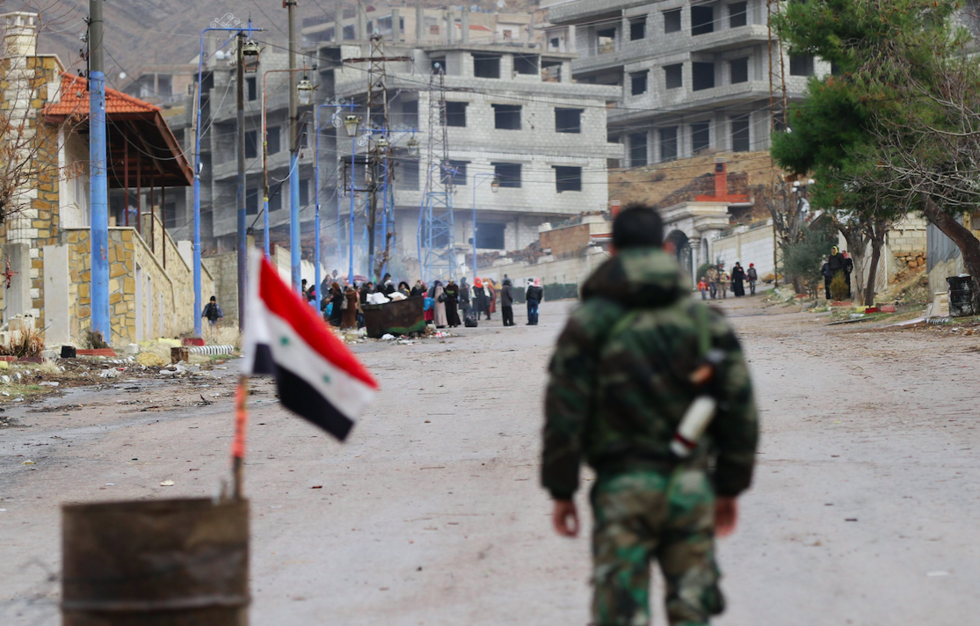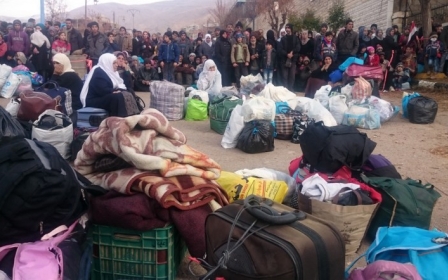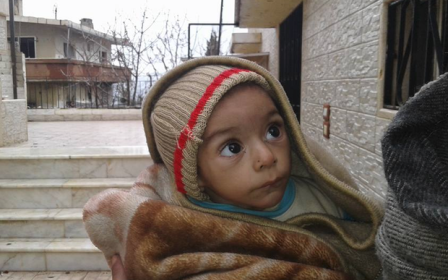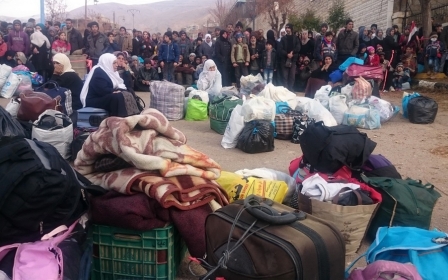People still dying of starvation in besieged Syrian town despite aid delivery

At least five people have starved to death in the Syrian town of Madaya in the past five days, even after a large aid convoy was allowed to enter the town, an international NGO has said.
According to medics supported by the international medical humanitarian organisation Medecins Sans Frontieres/Doctors Without Borders (MSF) in the besieged town, by Friday afternoon at least 35 people had been confirmed to have died from starvation since December.
Amid international pressure for action to help besieged Syrians, Russia criticised the UN for taking a political position by focusing on Madaya, which is besieged by pro-Assad forces, rather than areas where opposition militants are imposing sieges.
Russia's deputy representative to the United Nations, Vladimir Safronkov, said on Friday that Russia was "extremely concerned" at the fate of civilians in Madaya, where he said residents were being used as "human shields" by militant groups like al-Nusra Front.
However, he criticised the UN Security Council for responding to France's request for an urgent meeting to discuss the humanitarian situation in Syria, and especially in besieged areas, saying the UN was "politicising humanitarian issues".
Twenty-three people starved to death in Madaya in 2015, and seven people died as the convoy was en route - five people have died since aid convoys entered the town on 11 January. The death toll does not include those who have been killed by snipers or landmines as they tried to leave the town, at present home to some 40,000 people.
A further 18 people - ranging from a seven-month-old girl to a 70-year-old woman - are believed to be in critical condition and need to be evacuated immediately, MSF said. The UN says that so far only nine people have been allowed to leave the town, close to the Lebanese border, for treatment.
“This is shocking; patients are still dying despite the arrival of two big international humanitarian convoys,” Brice de le Vingne, Director of Operations for MSF, said in a statement.
“Some of the current patients may not survive another day. Medical evacuations for the most critically sick and malnourished need to happen immediately, and it is hard to understand why patients clinging on to life have not already been evacuated.
“Nothing should be allowed to hold this up, and everything possible should be done by the warring parties and the agencies involved in the convoys to expedite these evacuations as a life-saving humanitarian act."
The town has been surrounded by Syrian government troops and pro-government Lebanese Hezbollah fighters who have been besieging the town since last year and have widely been blamed for not letting any supplies in, forcing residents to eat grass and domestic pets to try and stay alive.
The government has denied the allegations, saying that rebel forces in the town have prevented supplies from reaching the populace.
Statistics vary widely, but sieges and starvation tactics have both been widely employed during the almost five-year-long bloody conflict in which more than 260,000 people have been killed and millions displaced.
The UN’s Office for the Coordination of Humanitarian Affairs (OCHA) puts the current number of Syrians besieged at 393,700 while Siege Watch, a monitoring network, says the figure stands at more than a million. MSF puts the figure at close to two million.
The UN on Friday strongly condemned Syria's "barbaric" sieges and demanded immediate access to besieged towns to deliver food, medicine and other life-saving aid.
"There can be no reason or rational, no explanation or excuse, for preventing aid from reaching people," UN aid official Kyung-Wha Kang told an emergency Security Council meeting on ending the blockades.
"The barbarity of this tactic cannot be overstated. You cannot let more people die under your watch," Kang told the council.
However, the UN has been accused of downplaying the humanitarian emergency in the months running-up to the crisis.
A Middle East Eye investigation, published on Friday, found that OCHA staff allowed officials in Damascus to edit a key report on the issue, without seeking authorisation from the main regional offices in Turkey and Jordan.
According to emails seen by MEE, the government was allowed to change the word "conflict" to "crisis" and “besieged" and "siege" with "locations listed in UNSCR 2139, 2165, 2191," a reference to adopted UN Security Council resolutions that give aid agencies access to besieged areas without the Syrian government's approval.
“The humanitarian response plan in Syria, like in any other country, is done in consultation with the authorities,” OCHA spokesman Jens Laerke said on Friday in response to questions about the edits. “This is normal practice.”
The United Nations says that it continues to struggle to deliver aid to about 4.5 million Syrians who live in hard-to-reach areas.
French Ambassador to the UN Francois Delattre said on Friday that out of the 91 current requests from the United Nations to deliver aid in Syria, only 13 have been granted.
British Deputy Ambassador Peter Wilson has likewise warned that "Madaya is just the tip of the iceberg” and that the scenario could be repeated "many, many times over" if the international community does not act.
New MEE newsletter: Jerusalem Dispatch
Sign up to get the latest insights and analysis on Israel-Palestine, alongside Turkey Unpacked and other MEE newsletters
Middle East Eye delivers independent and unrivalled coverage and analysis of the Middle East, North Africa and beyond. To learn more about republishing this content and the associated fees, please fill out this form. More about MEE can be found here.




